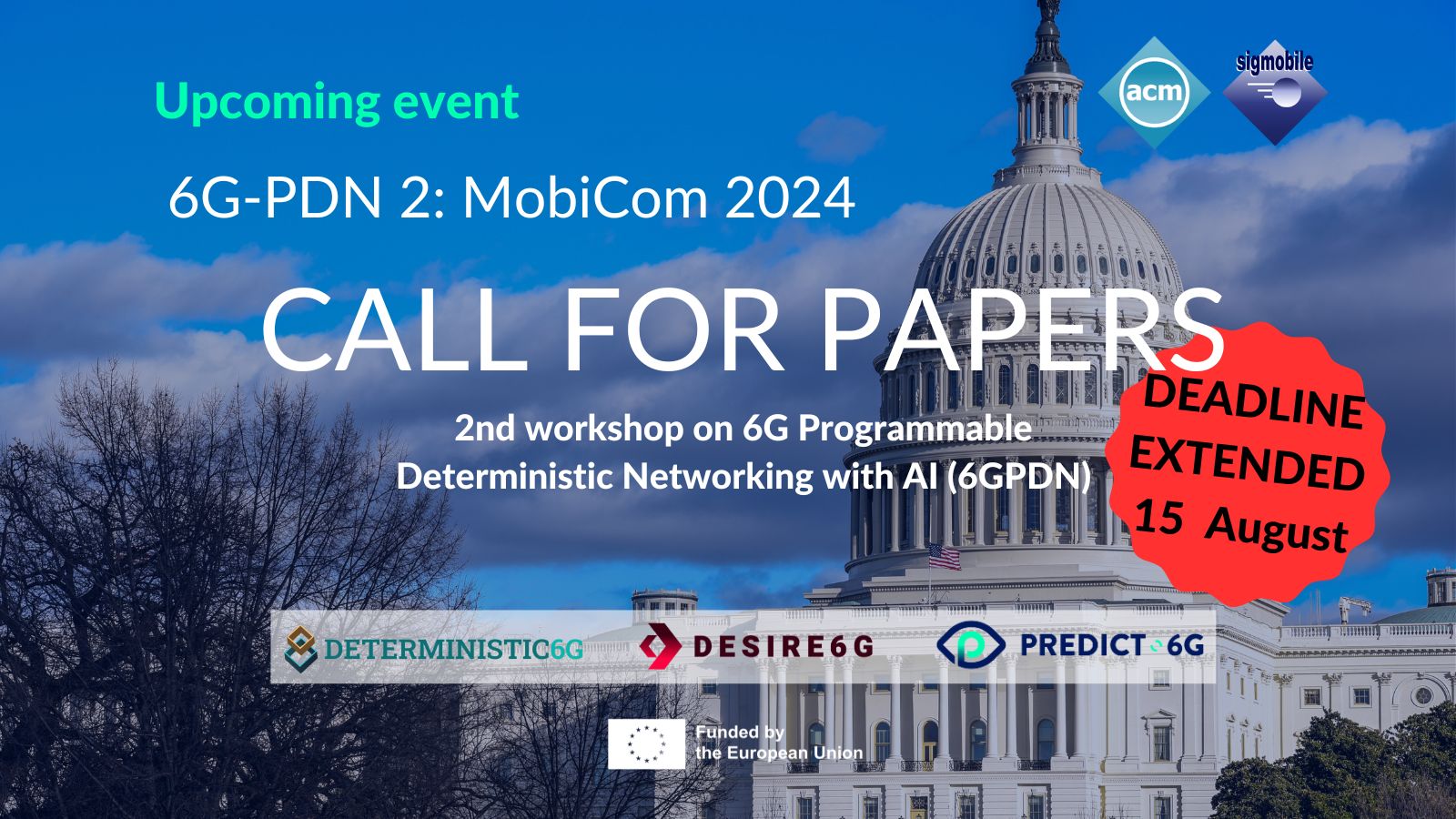2nd 6G-PDN Workshop: 6G Programmable Deterministic Networking with AI
PREDICT-6G, DETERMINISTIC6G and DESIRE6G are organizing the second edition of 6G-PDN on the 18 of November 2024, co-located with the 30th Annual International Conference on Mobile Computing And Networking (MobiCom 2024), which will be held in Washington DC, USA, 18- 22 November 2024.
The workshop will discuss the roadmap and challenges in the technological areas of deterministic communications and deep network programmability in 6G to support future end-to-end time-critical applications. All information is available at: https://6g-pdn2.netcom.it.uc3m.es/

Programme for Monday 18 November 2024
| Agenda item | Duration |
|---|---|
| Welcome and Workshop Introduction | 15 min. |
| Keynote: “Time-critical and deterministic services over 5G” Amir Gomroki (Head of 5G for North America and 5G-ACIA Ambassador, Ericsson Research) | 60 min. (45 min + 15 min QA) |
| Technical session #1 | 75 min. |
| Break | |
| Technical session #2 | 75 min. |
| Experts panel from industry and research institutes | 50 min. |
| Summary and conclusions | 10 min. |
| End of workshop & Social networking | Total: 285 min. / 4hrs 45 min. + break |
We plan for a half-day workshop with an open call for papers to be presented in two technical sessions. In addition, we will invite experts from the field to provide their view stemming from IEEE 802.1 TSN, IETF DetNet and 3GPP TSC to foster the exchange of different viewpoints.
Call for papers
Over the past decade the mobile communications system has transformed into a fundamental infrastructure that supports digital demands from all industry sectors. 6G is envisioned to accelerate the path started in 5G for catering to the needs of a wide variety of vertical use cases, both current and emerging. That will however require major enhancements to the current 5G capabilities, in terms of well-established key performance indicators (latency, reliability, bandwidth etc.), as well as new key value indicators (sustainability, trustworthiness etc.) that are currently being formed. Creating a deterministic network, understood as end-to-end time sensitive, reliable, and predictable communications, remains a challenge for cellular networks, especially in an industrial context. Wired deterministic communication standards have already emerged including Time Sensitive Networking (TSN) and Deterministic Networking (DetNet) and 5G has specified mechanisms for interworking with those standards. However, the available support of 5G in conjunction with TSN and DetNet is not sufficient for future end-to-end time-critical applications. Network programmability and predictability is key in supporting emerging 6G networks in achieving their promises of increased performance and flexibility at a lower cost. Deep network programmability, that is the ability to program the network fabric both vertically (control and data plane) and horizontally (end-to-end from the radio to edge and core network), is expected to characterize the new generation of mobile networks (6G), currently under development, towards supporting extreme performance requirements and service-specific operations. Enriching next-generation mobile networks with data plane programming capabilities can bring significant benefits with regards to network slicing and multi-tenancy, dynamic traffic engineering, offloading network functions to the data plane, etc. Coupled with edge solutions and advanced machine learning algorithms for prediction and network automation can help to overcome network performance limits, e.g., in terms of latency and deterministic delivery.
TPC Chairs
Dr. János Harmatos, Ericsson Hungary – General co-chair
Dr. Antonio de la Oliva, University Carlos III Madrid (UC3M) – General co-chair
Dr. Chrysa Papagianni, University of Amsterdam (UvA) – General co-chair
Key dates
- Paper submission: 15 August 2024
- Notification of Acceptance: 23 August 2024
- Camera Ready and Registration: 13 September 2024
- Start conference & Workshop: 18 November 2024
TPC Committee
This workshop is organized by three Horizon Europe 6G-SNS JU projects, DETERMINISTIC6G, PREDICT-6G and DESIRE6G. As such, we propose to invite key researchers from top European institutions participating in similar projects to be part of the TPC list. These researchers include:
Carla Chiasserini (POLITO), Claudio Casetti (POLITO), Carlos J. Bernardos (UC3M), Manuel Lorenzo (Ericsson), Peter Szilagyi (Nokia), Juan Jose Vegas Olmo (nVidia), Aurora Ramos (Atos), Sebastian Robitzsch (InterDigital), Sandor Laki (ELTE), Silvester Nádas (Ericsson), Istvan Godor (Ericsson), Xi Li (NEC), Fabio Verdi (UFScar), Panagiotis Papadimitriou (UoM), Filippo Cugini (CNIT), Luca Valcarenghi (SSSA), Hasanin Harkous (Nokia Bell Labs), Chia-Yu Chang (Nokia Bell Labs), Gergely Pongracz (Ericsson), Marios Avgeris (ÉTS), Paola Grosso (UvA), James Gross (KTH), Joachim Sachs (Ericsson), Janos Harmatos (Ericsson), Raheeb Muzaffar (Silicon Austria Labs), Marilet De Andrade Jardim (Ericsson), Gourav Prateek Sharma (KTH), Hans-Peter Bernhard (Silicon Austria Labs), Fjolla Ademaj (Silicon Austria Labs), Mahin Ahmed (Silicon Austria Labs), Frank Dürr (University of Stuttgart)
Publicity co-Chairs: Jessica Carneiro and Alejandra Espino (AUSTRALO)
Submitted papers may cover any of the following topics:
- Programmable data planes for TSN
- Enhancements towards 6G TSN and DetNet integration
- Network softwarization for 6G
- Programmable networking protocols
- Programmable SDN and NFV: languages and architectures (P4 and others)
- Hardware acceleration for programmable network functions
- Multitenant data planes
- Orchestration and management of software-defined deterministic networks
- Control and management of data plane programmable devices
- Artificial intelligence for deterministic networks
- In network machine learning
- In-network service level tuning and optimization; QoS
- High precision traffic monitoring/telemetry
- Service assurance and fulfilment programmability
- Slicing for 6G
- Intent-based systems and digital twinning applied in 6G
- Routing and scheduling algorithms for reliable and real-time IoT
- Trustworthy edge and cloud computing architectures and services
Submission instructions
Authors are invited to submit original contributions written in English that have not been published or submitted for publication elsewhere. Technical papers must be formatted using the ACM 2-column format and should be 5 pages. Papers should be submitted through https://6g-pdn24.hotcrp.com/
